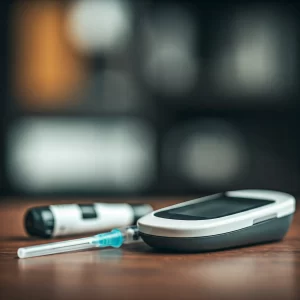Diabetes, also known as diabetes, is a chronic metabolic disease in which blood sugar (glucose) levels rise above normal. Glucose is an essential sugar that the body uses as an energy source and is derived from the food we consume. However, for glucose to be used by cells, the hormone insulin secreted by the pancreas is needed. In diabetics, either insulin production is insufficient or the insulin produced cannot be used effectively. This leads to persistently high blood sugar levels and can cause serious health problems in the long term.
Diabetes is classified into different types, such as type 1 diabetes, type 2 diabetes and gestational diabetes. Type 1 diabetes usually occurs when the immune system attacks the insulin-producing cells in the pancreas and usually starts in childhood or early life. Type 2 diabetes usually develops as a result of obesity, unhealthy lifestyle and genetic factors and is more common in adults. Gestational diabetes occurs during pregnancy and usually disappears after birth.
Symptoms of Diabetes
The symptoms of diabetes can vary depending on the type and severity of the disease. However, the following symptoms are usually among the early signs of diabetes:
1. Excessive Thirst and Frequent Urination
The body needs more fluid to balance high blood sugar, which leads to increased thirst and frequent urination.
2. Extreme Fatigue
When cells cannot use glucose for energy, the body feels constantly tired. This is common in people with type 1 and type 2 diabetes.
3. Sudden Weight Loss
Especially in type 1 diabetes, the body starts using fat and muscle tissue to produce energy, leading to sudden weight loss.
4. Blurred Vision
High blood sugar can cause swelling of the eye lens, which can temporarily affect vision.
5. Late Healing of Wounds
High blood sugar negatively affects blood circulation and the immune system. Therefore, cuts and wounds heal more slowly in diabetic patients.
6. Frequent Infections
Diabetes can weaken the immune system, making conditions such as urinary tract, skin and fungal infections more common.
Prevention and Treatment of Diabetes
The aim of diabetes treatment is to keep blood glucose levels in the normal range and reduce the risk of complications. This is possible by adopting a healthy lifestyle, exercising regularly and eating a balanced diet. Insulin treatment is mandatory for type 1 diabetes, while type 2 diabetes may require oral medications or insulin treatment in addition to lifestyle changes.
Early diagnosis is vital in preventing complications that diabetes can cause. As Center Clinic, we are at your side in diabetes diagnosis, treatment and follow-up processes with our specialist physicians. Don't forget to get regular check-ups and professional support for a healthy life.






